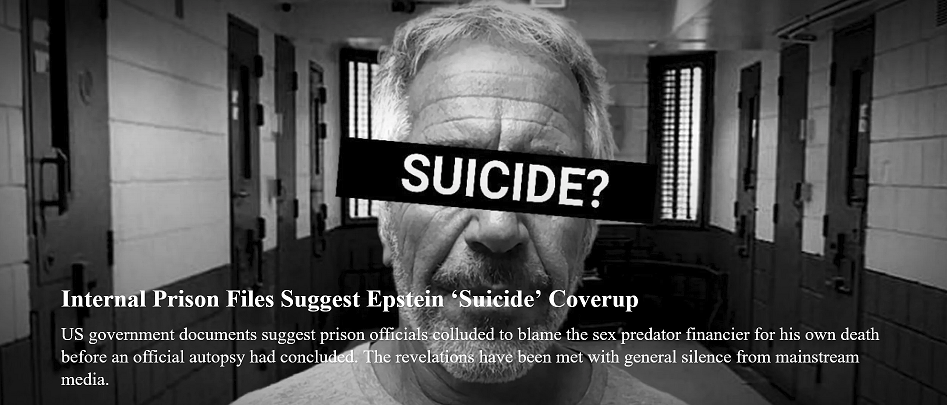-
Internal Prison Files Suggest Epstein ‘Suicide’ Coverup

Internal US Bureau of Prison (BOP) documents obtained by The Grayzone under Freedom of Information laws raise extremely serious questions about whether Jeffrey Epstein’s alleged first suicide attempt on July 23, 2019 in fact happened, and suggest the Bureau distorted evidence to attribute his death to suicide before his autopsy had even been completed. This meant the narrative of suicide was pushed on the public – to the exclusion of all other explanations – before basic facts were ascertained.
The release in January of previously sealed court documents detailing official investigations and civil lawsuits leveled against Epstein has reignited public interest in the late sex offender. Yet establishment journalists have poured cold water on the disclosures, assuring readers they do not offer anything new or of any import, while strongly implying they many shocking accusations they contain are bogus. References to Epstein’s apparent death are largely absent from mainstream reporting.
Officially, Epstein was found to have died in his cell at New York City’s Metropolitan Correctional Center on August 10, 2019, with a medical examiner ruling at the time that he had taken his own life by hanging. The ruling was aggressively contested by Epstein’s associates and widely disbelieved by the public, with one poll suggesting just 16% of Americans think he committed suicide.
There was good reason for their skepticism. Epstein’s legal team publicly declared available evidence on his death was “far more consistent” with murder. Dr. Michael Baden, a leading forensic pathologist who monitored the autopsy, also claimed its findings “did not support suicide.” Moreover, knowledgeable sources revealed broken bones in Epstein’s neck were “more common in victims of homicide by strangulation.”
When a long-awaited Justice Department report on Epstein’s “custody, care, and supervision” by the BOP while briefly incarcerated was released in June 2023, it too was greeted with near-complete indifference by legacy media. Now, The Grayzone has secured the internal Bureau documents which indicate that efforts to cover up Epstein’s suspicious death were more extensive than previously known, and included prison staff.
‘Lacerated’ or not?
The official inquiry by the Department of Justice Inspector General states that on July 23, 2019, nearly three weeks before his death, Epstein was found injured and semi-conscious in his cell, with marks of an unspecified nature around his neck. Per the report, he subsequently claimed to know nothing about the incident, which took place just two-and-half-weeks following his imprisonment on charges of child sex trafficking. Epstein’s cellmate, former New York police officer Nicholas Tartaglione, also pleaded ignorance. (Tartaglione previously shared legal representation with Ghislaine Maxwell, Epstein’s partner and ‘madam.’ He was convicted in April 2023 of killing four men, shooting three and strangling one to death.)
Within minutes of Epstein’s alleged discovery by prison guards, BOP officials formally logged the inmate’s attempted suicide via “hanging/asphyxiation” in internal records. Sections of the report describing what precisely occurred are redacted, as is the author’s name. The prisoner’s account of how he sustained his purported injuries, provided in a medical examination five hours later, is also concealed from public view in the now-released files.
The records show that the following day, Epstein was removed from suicide watch and charged with violating prison code 228, which covers “tattooing or self-mutilation.” It is unclear why this took place. In internal communications, one BOP official openly pondered whether Epstein was “mentally capable of proceeding with the disciplinary process.” Another incongruously said of the disciplinary hearing: “I would feel really uncomfortable doing this.”
Curiously, on July 30, the official incident report was updated to include “self-mutilation” as the cause of Epstein’s failed suicide, citing indeterminate “lacerations.” However, an examination by prison doctors just hours after he allegedly tried to take his life mentioned zero lacerations. A subsequent memo by a prison psychologist noted that “Epstein had a poor attitude” in interviews and refused to discuss the matter, but concluded that the amended incident report was “accurate,” and allegation of attempted suicide “warranted.”
A memo issued after the incident eerily notes that Epstein’s “self-mutilation” was “expunged” from official records. Just five days after Epstein’s death, a BOP representative remarked it was “unclear why it had been expunged and whether Mr. Epstein knew this.” Mainstream media has not acknowledged this peculiar episode since the memo appeared. It has also ignored the critical question of whether the alleged incident ever took place at all – or whether it was fabricated to bolster the case for suicide.
Epstein placed on suicide watch despite having “denied…suicidal or self-harm thoughts”
The BOP records show Epstein complained frequently to authorities about the conditions of his incarceration. His cell toilet lacked sufficient paper, and flushed continuously for extended periods, he said, and his cellmate apparently yammered on incessantly, especially at night. But there is nothing in the files to suggest that Epstein ever felt threatened or depressed. In fact, several psychological assessments conducted at the jail indicate he was optimistic about his prospects. One evaluation noted that he explicitly denied “suicidal ideation, planning, and intent,” and was “[committed] to life and safety.”
“[Epstein] exhibited a neutral affect with appropriate range,” the evaluation observed. “Eye contact and hygiene were appropriate… His thoughts were organized and coherent, with no loosening of associations or tangential, circumstantial, or irrelevant content… There was no evidence of perceptual disturbance, delusional ideation, or a formal thought disorder. He did not engage in any bizarre or inappropriate behavior.”
Another appraisal detailed “protective factors” Epstein enjoyed, citing conversations in which he “denied current suicidal or self-harm thoughts,” or “feeling hopeless.” He also “denied fearing for his safety,” and outlined “plans to finish this case and to go back to his normal life.”
He praised his “emotionally supportive” friends and lawyers and said that, as a practicing Jew, he abhorred suicide, the report noted. Given that the “overall acute suicide risk for this inmate” was “low” and the “overall chronic suicide risk for this inmate” was “absent” entirely, the BOP concluded: “suicide watch is not warranted at this time.”





Login or Register to Leave a Comment